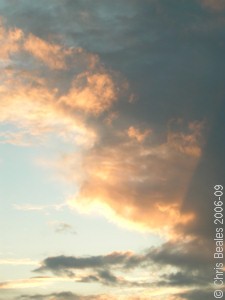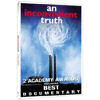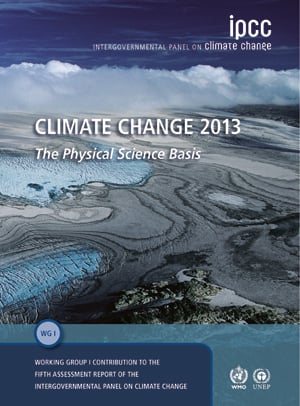
What is Climate Change?
The climate change we are talking about here is the change to weather patterns, which are being caused by human activities (for example: burning oil for energy). This change is serious and goes beyond any natural processes, particularly considering how fast it is happening. It will have consequences for ourselves and for much of life on Earth.

A quick note about sceptics - There are still people out there in denial, for example those who argue that there is "...some doubt from some scientists that climate change is really happening...or that it is caused by human activities...". This is wrong. It may have been a fair point 15 to 20+ years ago, but the science has moved on and the evidence is now indisputable. Unfortunately, parts of the media and other organisations keep this denial alive with spurious stories like the "climategate scandal".
There is a psychological problem as well, which probably underlies the scepticism: the human mind didn't evolve to deal with problems on the scale of climate change. And when we can't deal with things we are very good at looking the other way.

The Freezing Winter 2009-10 does not mean that Global Warming is not happening - During December 2009 and January 2010 we experienced some harsh winter weather across the UK, Northern Europe, China and central USA. However, this is not evidence that there is now some doubt in the global warming trend. It is important to notice that during this winter, other parts of the world were a lot warmer than normal (for example in Greece and Alaska).

What is climate change?

I would strongly advise you to watch the documentary film "An inconvenient truth" to get a good understanding of the issue. Whether you know a lot about climate change or you are not sure what it is all about, this film is outstanding. And I can see why Al Gore has been given a Nobel Peace Prize for it. The web address is www.climatecrisis.net: buy it or borrow it from a library - and pass it around your friends.

A basic explanation - In this page I have tried to summarise how we are changing the climate, presenting you with some of the key phrases, like "greenhouse gas" and "global warming". There are links at the bottom to useful, on-line sources of further information.
The authoritative view

The core group of people that are looking into the climate change problem are the Intergovernmental Panel on Climate Change (IPCC). You can see their latest findings at the IPCC website. Their Fourth Assessment Report (AR4) was published in 2007. This is the consensus of all of the world's leading climate scientists. Its findings are quite worrying, especially how much change has accelerated more than they predicted in the previous report. However, they do make clear that we can make a difference (i.e. mitigate the problem) if we act now. There is a lot of information on their website, you will probably want to start by reading the Summary for Policymakers documents in AR4, starting with "The Physical Science Basis".

The IPCC fifth assessment report (AR5) was released on the 30 September 2013. There have been improvements in the science since the last report, with 6 years of more data to analyse and more powerful climate models. It is the same story of global warming. Notably: there has been an increase in confidence that human activities are the principal cause; air temperatures a rising more slowly; but sea levels are rising faster than in the previous report.
The IPCC received a Nobel Peace Prize in 2007, which is a strong recognition of their work for humanity. You will now find that every political leader in the world knows that climate change is happening. Some of them may be paying lip service to the issue but they know it is important. One of the key things that convinced politicians was an economic paper: the Stern Review on the Economics of Climate Change. The conclusions of this paper were that climate change will cost between 5% and 20% of global GDP(Gross Domestic Product), each year (now and forever), if we don't do anything about it. This compares to a cost of 1% of global GDP to do something about it if we start now. There is nothing quite like hitting our leaders in the wallet to persuade them to start taking it seriously!
The Copenhagen Diagnosis is a report, compiled by the University of New South Wales, to update policy makers in time for the December 2009 - Copenhagen climate summit (COP15). This report shows how quickly the science is moving in our understanding of climate change. Unfortunately it finds evidence that things are even worse than predicted in AR4. Our emissions of greenhouse gases continue to rise, ![In 2008 they were 40% higher than 1990 levels [i]](../images/_info.jpg) and measurements of ice melt and sea level rise are faster than expected.
and measurements of ice melt and sea level rise are faster than expected. ![80% above past IPCC projections [i]](../images/_info.jpg)

![link to W3C validation website, which will show that the stylesheets are Valid CSS [css]](http://jigsaw.w3.org/css-validator/images/vcss-blue)
![link to information about this website [info]](../images/btn_info.jpg)
![jump up to the top of this page [top]](../images/btn_top.jpg)